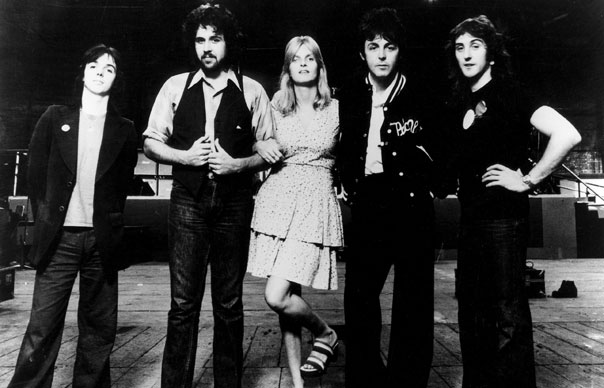In this exclusive interview from Uncut’s June 2007 issue, the Beatles legend recalls his controversial time as leader of Wings. “It was a strange period,” he admits… Interview by David Cavanagh ____________________ March 15, 2007. Soho Square is bathed in buoyant sunshine as a few lunchtim...
Guitarist Laurence Juber remembers the band listening to “a lot of reggae, new wave, whatever was in the air”. Things looked promising. But Back To The Egg (1979) saw McCartney’s innate conservatism scupper the experiment. He just couldn’t help inviting some decidedly pre-punk acquaintances – Dave Gilmour, Pete Townshend, John Bonham, Ronnie Lane – to participate in an Abbey Road supergroup (the Rockestra) on a couple of gratuitous blowouts.
Stung by the album’s rejection – it yielded no UK hits – McCartney focused his mind on the upcoming world tour. After the UK, Wings’ next stop was Japan, where the authorities had finally relented and allowed McCartney permission to play 11 sell-out concerts. He and Linda flew into Tokyo’s Narita Airport on January 16, 1980. Just prior, Wings had dispensed with their usual sound equipment team, sending their production schedules awry. “The crazy thing is that I hadn’t allowed enough time to rehearse,” McCartney says. “Normally I’m very good about that. But we were only going to have a week to put the whole Tokyo show together. We were up against it. It was like fate…. closing us down.”
The McCartneys approached airport customs: surely a formality. Television crews and hundreds of fans crowded around to welcome them. But McCartney had forgotten – or perhaps was unaware – that 229g (about half a pound) of top-quality marijuana was packed in his luggage.
He leans forward. “I’ve asked myself, ‘Why was that pot in the suitcase? So… obviously. And so much of it.’ I mean, there was not one hint of discretion. And if you see the film of the arrest, the guy is embarrassed to find it. He almost puts it back and closes the suitcase.”
Juber: “I was standing next to him. I looked at the suitcase. Then I looked at Paul’s face. He’d turned white.”
McCartney was escorted to the Tokyo Metropolitan Police Office, where he spent 10 days in a cell, subsisting on bread and coffee. He was denied a guitar. Meanwhile, his lawyers tried legal and diplomatic routes to free him.
“It was such a different world,” he says softly. “It was like going to another planet. They would say, highly curious, ‘You are MBE?’ And I’d say ‘Yeah’, hoping that would carry weight. And it sort of did. They were a bit deferential. Then they said, even more curious, ‘You live at Queen’s Palace?’ I said, ‘Well, no, not actually… Well, yes, quite near.’ I was hoping they might let me off if I lived near the Queen’s house. ‘You smoke marijuana?’ ‘Hardly ever.’ They said, ‘Make you hear music better?’ I thought, God, I wonder if that’s a trap.” After some concern that he might go to prison, McCartney received a fine and was made to contribute £184,000 to the ticket refunds for the cancelled tour. He was then deported.
Everyone in the Wings camp was furious with him for sabotaging a potentially lucrative tour, not least Denny Laine. The faithful Laine had been an ever-present since ’71, on a system of retainers and salaries, and had co-written “Mull Of Kintyre” with McCartney. Later, suffering financial hardship, Laine sold McCartney his publishing rights to the song. In 1986 he was declared bankrupt. He now lives in either LA or Las Vegas – it’s not clear from his MySpace page – and does not respond to Uncut’s email requesting an interview.
Wings officially ended in April 1981 when Laine left. By then, McCartney had released the solo LP, McCartney II (hit single: “Coming Up”) and was wondering if the grass in the suitcase at Narita Airport had been subconsciously placed there by himself – as a non-negotiable, unequivocal way of freeing him from the pressure of a 1980 world tour.
“I wondered. I wonder to this day if there was something strange like that. But it would be subconsciously, because I absolutely wasn’t doing it on the surface. It [his post-Wings solo career] was a new start, an enforced new start. [Pause] Or was it? Did I subconsciously force it on myself? I don’t know. I don’t know. It was a strange period.”
Our interview is over. It’s time for me to leave the presidential bubble. McCartney is still ruminating on spooky, subconscious matters as he shows me to the door. He says he recognises me now. I tell him he’s mistaken, we’ve never met. But he’s adamant: we’ve met before. I assure him we haven’t.
“Is that right? Oh. Well, that’s the wonderful thing about senility,” he beams, accompanying me out into reception. “You’re always meeting interesting new people.”


